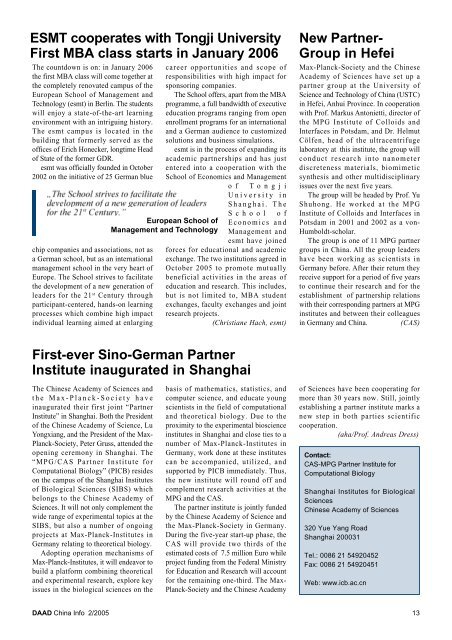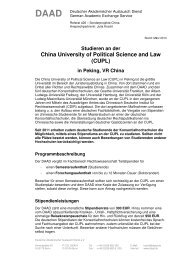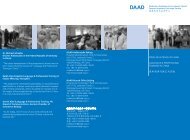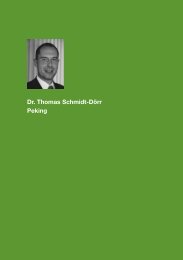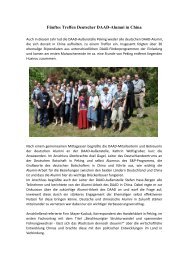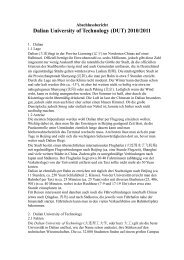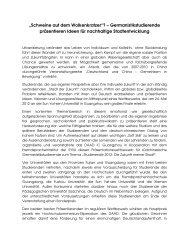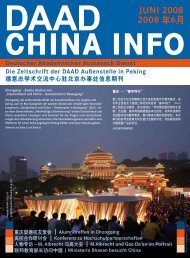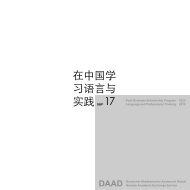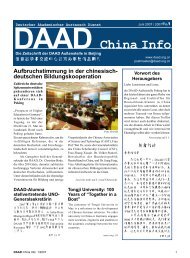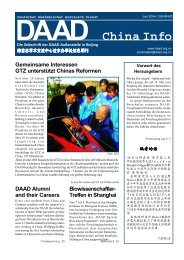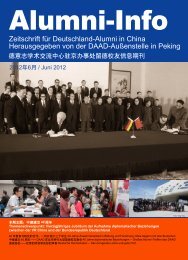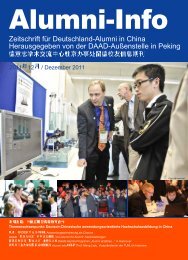China Info - DAAD
China Info - DAAD
China Info - DAAD
Sie wollen auch ein ePaper? Erhöhen Sie die Reichweite Ihrer Titel.
YUMPU macht aus Druck-PDFs automatisch weboptimierte ePaper, die Google liebt.
ESMT cooperates with Tongji University<br />
First MBA class starts in January 2006<br />
The countdown is on: in January 2006<br />
the first MBA class will come together at<br />
the completely renovated campus of the<br />
European School of Management and<br />
Technology (esmt) in Berlin. The students<br />
will enjoy a state-of-the-art learning<br />
environment with an intriguing history.<br />
The esmt campus is located in the<br />
building that formerly served as the<br />
offices of Erich Honecker, longtime Head<br />
of State of the former GDR.<br />
esmt was officially founded in October<br />
2002 on the initiative of 25 German blue<br />
chip companies and associations, not as<br />
a German school, but as an international<br />
management school in the very heart of<br />
Europe. The School strives to facilitate<br />
the development of a new generation of<br />
leaders for the 21 st Century through<br />
participant-centered, hands-on learning<br />
processes which combine high impact<br />
individual learning aimed at enlarging<br />
First-ever Sino-German Partner<br />
Institute inaugurated in Shanghai<br />
The Chinese Academy of Sciences and<br />
the Max-Planck-Society have<br />
inaugurated their first joint “Partner<br />
Institute” in Shanghai. Both the President<br />
of the Chinese Academy of Science, Lu<br />
Yongxiang, and the President of the Max-<br />
Planck-Society, Peter Gruss, attended the<br />
opening ceremony in Shanghai. The<br />
“MPG/CAS Partner Institute for<br />
Computational Biology” (PICB) resides<br />
on the campus of the Shanghai Institutes<br />
of Biological Sciences (SIBS) which<br />
belongs to the Chinese Academy of<br />
Sciences. It will not only complement the<br />
wide range of experimental topics at the<br />
SIBS, but also a number of ongoing<br />
projects at Max-Planck-Institutes in<br />
Germany relating to theoretical biology.<br />
Adopting operation mechanisms of<br />
Max-Planck-Institutes, it will endeavor to<br />
build a platform combining theoretical<br />
and experimental research, explore key<br />
issues in the biological sciences on the<br />
career opportunities and scope of<br />
responsibilities with high impact for<br />
sponsoring companies.<br />
The School offers, apart from the MBA<br />
programme, a full bandwidth of executive<br />
education programs ranging from open<br />
enrollment programs for an international<br />
and a German audience to customized<br />
solutions and business simulations.<br />
esmt is in the process of expanding its<br />
academic partnerships and has just<br />
entered into a cooperation with the<br />
School of Economics and Management<br />
of Tongji<br />
University in<br />
Shanghai. The<br />
School of<br />
European School of Economics and<br />
Management and Technology<br />
Management and<br />
esmt have joined<br />
forces for educational and academic<br />
exchange. The two institutions agreed in<br />
October 2005 to promote mutually<br />
beneficial activities in the areas of<br />
education and research. This includes,<br />
but is not limited to, MBA student<br />
exchanges, faculty exchanges and joint<br />
research projects.<br />
(Christiane Hach, esmt)<br />
basis of mathematics, statistics, and<br />
computer science, and educate young<br />
scientists in the field of computational<br />
and theoretical biology. Due to the<br />
proximity to the experimental bioscience<br />
institutes in Shanghai and close ties to a<br />
number of Max-Planck-Institutes in<br />
Germany, work done at these institutes<br />
can be accompanied, utilized, and<br />
supported by PICB immediately. Thus,<br />
the new institute will round off and<br />
complement research activities at the<br />
MPG and the CAS.<br />
The partner institute is jointly funded<br />
by the Chinese Academy of Science and<br />
the Max-Planck-Society in Germany.<br />
During the five-year start-up phase, the<br />
CAS will provide two thirds of the<br />
estimated costs of 7.5 million Euro while<br />
project funding from the Federal Ministry<br />
for Education and Research will account<br />
for the remaining one-third. The Max-<br />
Planck-Society and the Chinese Academy<br />
New Partner-<br />
Group in Hefei<br />
Max-Planck-Society and the Chinese<br />
Academy of Sciences have set up a<br />
partner group at the University of<br />
Science and Technology of <strong>China</strong> (USTC)<br />
in Hefei, Anhui Province. In cooperation<br />
with Prof. Markus Antonietti, director of<br />
the MPG Institute of Colloids and<br />
Interfaces in Potsdam, and Dr. Helmut<br />
Cölfen, head of the ultracentrifuge<br />
laboratory at this institute, the group will<br />
conduct research into nanometer<br />
discreteness materials, biomimetic<br />
synthesis and other multidisciplinary<br />
issues over the next five years.<br />
The group will be headed by Prof. Yu<br />
Shuhong. He worked at the MPG<br />
Institute of Colloids and Interfaces in<br />
Potsdam in 2001 and 2002 as a von-<br />
Humboldt-scholar.<br />
The group is one of 11 MPG partner<br />
groups in <strong>China</strong>. All the group leaders<br />
have been working as scientists in<br />
Germany before. After their return they<br />
receive support for a period of five years<br />
to continue their research and for the<br />
establishment of partnership relations<br />
with their corresponding partners at MPG<br />
institutes and between their colleagues<br />
in Germany and <strong>China</strong>. (CAS)<br />
of Sciences have been cooperating for<br />
more than 30 years now. Still, jointly<br />
establishing a partner institute marks a<br />
new step in both parties scientific<br />
cooperation.<br />
(aha/Prof. Andreas Dress)<br />
Contact:<br />
CAS-MPG Partner Institute for<br />
Computational Biology<br />
Shanghai Institutes for Biological<br />
Sciences<br />
Chinese Academy of Sciences<br />
320 Yue Yang Road<br />
Shanghai 200031<br />
Tel.: 0086 21 54920452<br />
Fax: 0086 21 54920451<br />
Web: www.icb.ac.cn<br />
<strong>DAAD</strong> <strong>China</strong> <strong>Info</strong> 2/2005 13


